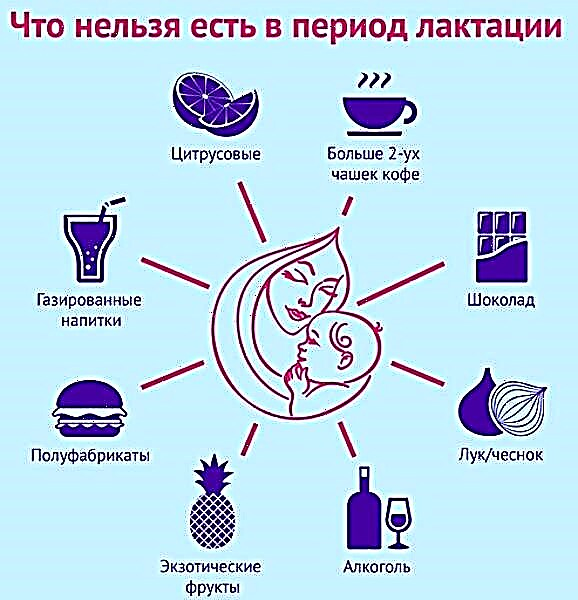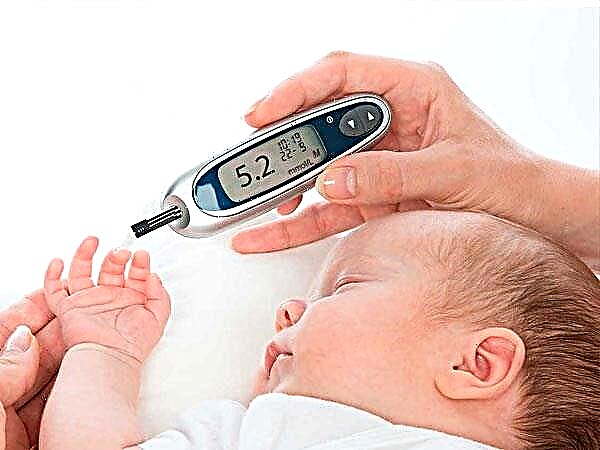The natural process of breastfeeding a baby raises many questions. One of them - what should be the diet when feeding a newborn with breast milk? After all, everything that a mother eats is also eaten by a baby. What is mom allowed to eat, so as not to harm him, but to bring maximum benefit? What can be included in the diet for a nursing mother of a newborn?

Diet while breastfeeding
Diet for a nursing mother
Proper nutrition of a nursing woman is the key to the health of not only the mother herself, but also the baby. Breastfeeding lays the foundations for immunity, physical and mental development. The main principle that should be guided in nutrition during lactation is caution.
Basic product list
The diet of a nursing mother of a newborn while breastfeeding includes the following list of foods:
- Meat - rabbit, turkey, lean beef, skinless chicken. All this is baked, stewed and boiled. Cook broths with low fat.
- Fish - river low-fat fish such as pike perch, cod or pollock in boiled or baked form.
- Fermented milk products - cheese, cottage cheese, low fat kefir, natural yogurt without additives.
- Vegetables - cauliflower, broccoli, pumpkin, zucchini. You can cook stews with a minimum of salt and oil.
- Groats - oatmeal, rice, buckwheat porridge.
- Oils - butter and unrefined vegetable oils.
- Durum wheat pasta.
- Nuts, dried fruits - almonds, walnuts, cashews, raisins, dried apricots, prunes, in moderation after meals or as a snack.
- Fruits and berries - apples, bananas, cherries, apricots. Should not be consumed on an empty stomach, preferably after breakfast or lunch.
- Drinks - pure still water, dried fruit compote, weak black and green tea, cranberry and lingonberry juice.
- Eggs, dry biscuits (Maria), whole grain bread, marshmallow or marshmallow.

Base foods and allergens
In fact, from such an impressive list of "allowed" and recommended products, you can easily make a varied menu, there are many recipes. Therefore, the diet for breastfeeding a newborn is not strict, but quite moderate, observing it, you will not have to starve.
Allergen products
There is a list of foods that pediatricians recommend not to eat during breastfeeding. This will reduce your baby's risk of allergies. In addition, some foods are generally best avoided despite breastfeeding. These include:
- canned food;
- smoked meats, pickles and marinades;
- semi-finished products and fast food;
- carbonated drinks;
- ready-made sauces and dressings - mayonnaise, ketchup;
- foods with preservatives, dyes and thickeners;
- Exotic fruits;
- alcohol.

Prohibited foods
Use with caution:
- cocoa and its derivatives - chocolate, sweets, chocolate butter;
- strawberries, strawberries and raspberries;
- coffee;
- citrus.
Important! These foods should be eaten in small portions. If the baby doesn't have allergies, great. But this does not mean that you can continue to eat them every day and in large quantities. For convenience, it is recommended to keep a nursing diary, in which to record each food intake, especially in the first months of feeding. So it will be more convenient to "calculate" the culprit of the allergy.
Menu options
An approximate menu for a day for a nursing mother is as follows.
Breakfast:
- dairy-free porridge (oatmeal, semolina, millet), as an option, porridge in milk, diluted half with water;
- tea, preferably without sugar.
2nd breakfast:
- vegetable soup with turkey broth;
- bran bread.
Dinner:
- second dish - boiled turkey fillet, chicken breast or white fish with a side dish: boiled buckwheat or rice, cauliflower, baked potatoes;
- dried fruit compote or tea.
Afternoon snack:
- tea with dry cookies, it is possible with children.
Dinner:
- steamed turkey or fish cutlets;
- boiled rice or buckwheat;
- compote, tea.
Nursing mother's diet
Meals should be fractional. The number of meals is at least 4-5, taking into account the appetite. Serving size should be standard, familiar. There is no need to increase it, in case of hunger, the number of receptions should be increased. It is necessary to drink enough liquid, the recommended 2-2.5 liters will be enough.

Diet and diet
Nutrition to increase lactation
In addition to general advice on a varied diet, there are detailed guidelines for when milk is insufficient. It is to increase the amount of breast milk that the following foods are recommended to be consumed:
- nuts;
- yeast;
- decoction of nettle;
- beer.
In a situation when a critical moment has come, and there is a question of transferring the baby to artificial nutrition, because the mother is losing milk, any means will be used. Do not overestimate their importance.
Important! The amount of milk is not less, but rather more influenced by the psychological and emotional state of the mother. If she has the opportunity to get enough sleep at night, and help appears in caring for the baby, then the milk will stop disappearing.
Increasing milk nutrition through diet
A breastfed baby receives two types of milk: front and back. Foremilk is thinner and more transparent. The back is thicker in consistency and color. It is considered “fatty” or “nutritious”. In order for the baby to “get” to hind milk, it is necessary to try to feed from only one breast. Then, quickly sucking out the front milk, the baby will get to the fat one.
There is really no need to increase its nutritional value. The mother's body is designed in such a way that all vitamins, minerals, enzymes, etc. necessary for growth and development are concentrated in breast milk. If the baby is not worried, he is gaining weight well, then everything is fine with the nutritional value of milk.
For your own peace of mind, you can take a milk test for fat content. It is carried out in specialized laboratories. As a supplement, you can include the following foods in the diet, which somewhat increase the nutritional value:
- nuts, seeds, sunflower halva - increase the calorie content, so they should be consumed in small portions;
- buckwheat - experienced nursing mothers advise to fry cereals in a dry frying pan and eat like seeds to increase the fat content of milk.
The rest of the recommendations are standard: a varied full breakfast, lunch, dinner and snacks will help better than any special equipment.
Diet of a nursing mother by months
Throughout the entire lactation period, you need to monitor your diet. Naturally, the diet of a nursing mother of a newborn changes by months, there will be fewer restrictions in it. In general, a strict diet is necessary in the following cases:
- allergy in the baby;
- first month of feeding;
- disruption of the digestive tract in a mother or child.
Important! According to many pediatricians, during lactation, you can eat the foods that the pregnant woman ate during the period of gestation. Provided that she felt well, and the baby fully developed in the womb.

Meals in the first month
Diet in the first month after childbirth
The first month is the most difficult in every sense. I have not yet recovered after childbirth, there is no skill in caring for a newborn. His stomach is not used to accepting food, the necessary enzymes have not yet populated the gastrointestinal tract. Therefore, it is in the first month that mom must follow a diet.
Allowed foods - fermented milk (cottage cheese, fermented baked milk), boiled or baked vegetables (potatoes, zucchini, cauliflower), boiled or baked dietary meat, poultry and fish (rabbit, turkey, cod, pollock), cereals (oat, buckwheat), fruits (bananas, green apples), dried fruits, and whole grain breads.
Menu supplement in 1-3 months
If the first month of feeding went without problems, the baby had no rashes and obvious problems with stool, the mother's diet can be diversified. During this period, the following products are allowed:
- boiled lean beef;
- skinless chicken breast;
- liver;
- hard cheese, sour cream with a fat content of up to 15%;
- millet, rice and corn porridge;
- fruit drinks and fruit compotes: lingonberries, cranberries, blueberries.
Each product must be administered in small portions. It is imperative to monitor the child's reaction, it may not appear immediately, but after 2-3 days. Therefore, for this period, do not enter new items in the menu.

After 1 month, the diet expands
Nutrition from 4 to 6 months
During this period, the diet can be significantly expanded. The following products are added to the list that has already been successfully mastered:
- boiled beets;
- lean pork;
- nuts;
- chicken or quail eggs;
- pasta.
Soups should be cooked in a light, low-fat broth, without using frying and a lot of seasonings. The second course can consist of stewed or boiled meat, fish or poultry; baking in the oven or airfryer is allowed. For garnish - a lot of vegetables and cereals. Drinks are varied: herbal and ordinary teas, compotes and fruit drinks, still mineral water.
Features of nutrition in the first year
It is in the first year, when breast milk is first the only, and then the main source of nutrition for the baby, it is necessary to adhere to the safety rules in organizing the nutrition of a nursing mother. Before eating this or that dish, you must clearly understand the following points:
- where the food was stored, and how strictly sanitary rules were followed;
- pay attention to the shelf life - due to what additives it was made so long;
- why fruits or vegetables retain their shine even after a month of storage in the refrigerator;
- how many times meat, fish or poultry has been thawed and frozen before it goes on sale.
Also, in the diet, it is necessary to follow reasonable principles, which it is advisable to observe at any time, not only during the feeding period. Such a memo will help organize the transition to a healthy lifestyle for the whole family:
- it is better to use boiled and baked than fried;
- it is better to reduce portions, but increase their number;
- if there are doubts about the safety of a product or dish, it is better not to eat this;
- gorging at night is harmful;
- do not completely exclude sweets from the diet, it is quite possible to use marshmallows, marshmallows and marmalade;
- limited physical activity, and not the amount of food, brings more harm; in order to lose weight, you need to move more.

The main principle of nutrition is safety
Misconceptions and myths about lactation diet
Despite the fact that breastfeeding is an absolutely natural process and has been implemented for exactly as many years as the person himself exists, many myths have formed around him. Surprisingly, there are still a lot of misconceptions about what you need to eat and how much, in order to "improve" milk and make it more "nutritious", what hypoallergenic foods should be eaten.
Such misconceptions include the following statements:
- A nursing mother definitely needs to drink milk or, in extreme cases, milk tea. In fact, not all adults like to drink milk. People do not feel the need for it, preferring alternative options from fermented milk products: kefir or yogurt, or are allergic to it - intolerance to cow protein. This circumstance does not at all exclude the possibility of such a woman successfully nursing an infant. In addition, newborns may lack an enzyme in the digestive system that breaks down this protein, and the baby himself may have an allergy.
- A breastfeeding mom should eat for two. This statement accompanies a woman from the period of gestation. Those who follow such advice and begin to consume a large amount of food, literally double the amount, then face problems with excess weight and bearing a fetus. After childbirth, excess weight does not go away for a long time. It is enough to eat well and varied. It is better to eat in small portions, but more often so as not to experience a constant feeling of hunger.
- If you eat poorly, your milk will be “poor and blue”. If you eat poorly, then the mother herself will be pale and blue, and not milk. The composition of breast milk does not depend on the extended menu. The lack of nutrients in milk is replenished from the mother's body, so it is she who needs a varied diet to replenish her strength.
- Be sure to take vitamin complexes, so the milk will become healthier. Any vitamins will be useful for the mother herself. But it's much better to eat a varied diet to get everything you need from natural and healthy foods. Also, not all elements are transferred through milk, the child will not receive more calcium or iron in this way. The baby will take everything he needs from the resources of his mother's body. Milk will not become more "fortified". Its composition changes with the age of the child.
The diet for nursing mothers of newborns should not be taken literally. What does not suit one mother will do quite well for another and will not cause problems for the baby. Therefore, it is necessary to observe the measure in the amount of food consumed and monitor its quality. Do not forget the main principle - not to harm your child.



